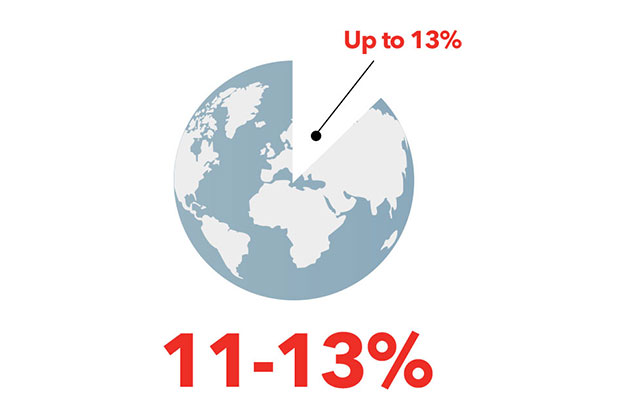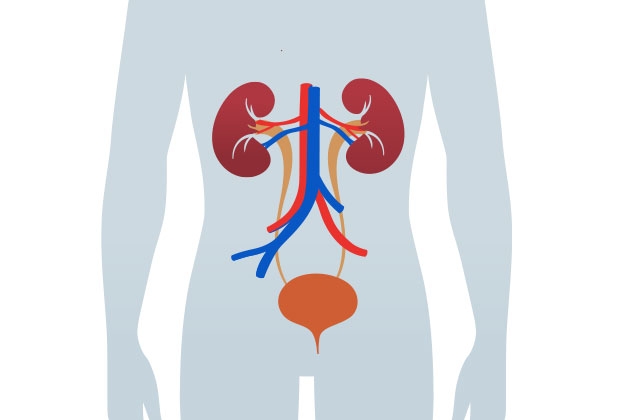CKD is a global health issue1
Chronic kidney disease (CKD) affects up to 13% of the global population.1 Being diagnosed with kidney disease can be a huge challenge, both for the patient and those people around them. Its diagnosis and management, particularly in advanced stages of kidney disease, can impact severely upon their physical and mental state.4

Global prevalence of CKD by stage
As shown in the graph, the estimated global CKD prevalence is between 11 and 13% with the majority of patients in stage 3.1 These results are in accordance with a more recent study by Obrador published in 2019.5

Understanding CKD - Kidney basics

You have two kidneys, each about the size of an adult fist, located on either side of the spine just below the rib cage. Although they are small, your kidneys perform many complex and vital functions that keep the rest of the body in balance, including elimination of wastes, regulation of blood composition, blood volume and blood pressure, as well as mineral homeostasis. When the kidneys are damaged or diseased, they can abruptly or progressively lose their ability to perform these vital functions. This results in waste and fluid build-up and abnormal hormonal regulation of blood pressure and mineral homeostasis.
The kidneys regulate:2

Waste elimination

Blood composition

Blood volume

Blood pressure

Mineral homeostasis
Definition of chronic kidney disease3
Chronic kidney disease describes the gradual loss of kidney function. According to the KDIGO 2017 Clinical Practice Guideline, CKD is defined as abnormalities of kidney structure or function, present for more than 3 months, with implications for health. Chronic kidney disease includes conditions that damage your kidneys and decrease their ability to keep you healthy. If kidney disease gets worse, wastes can build to high levels in your blood and make you feel sick. You may develop complications like high blood pressure, anemia (low blood count), weak bones, poor nutritional health and nerve damage. Also, kidney disease increases your risk of having heart and blood vessel disease.
Stages of CKD
based on glomerular filtration rate (GFR)3
The KDIGO 2017 Clinical Practice Guideline suggests the classification of chronic kidney disease into five stages, based on glomerular filtration rate (or GFR), which is one of the measures of kidney function that describes the flow rate of filtered fluid through the kidney. This measure tells you how much kidney function you have. As kidney disease gets worse, the GFR number goes down.

Talk to your doctor
If you have been diagnosed with CKD it is likely that you will have regular follow up appointments with your doctor to check how you are feeling and to monitor the progress of your symptoms. If you have been feeling fatigued or think you may have any of the symptoms of iron deficiency such as paleness, faintness or a racing heart, you may want to speak to your doctor about your symptoms. To get the most out of your visit, think in advance about the information that the doctor might need in order to work out what is causing your symptoms. You should also prepare any questions that you want to ask.
HQ-NA-2100201. Date of preparation September 2021
- Hill NR, et al. PLoS One. 2016;11(7):e0158765
- https://www.kidney.org/kidneydisease/howkidneyswrk date of access August 2020
- Levey AS, et al. Kidney Int. 2005;67(6):2089-2100
- Kefale B, Alebachew M, Tadesse Y, Engidawork E (2019) Quality of life and its predictors among patients with chronic kidney disease: A hospital-based cross sectional study.PLoS ONE 14(2): e0212184.
- Obrador GT. Epidemiology of chronic kidney disease. UpToDate. 2019
Insuficiența cardiacă apare când inima este afectată sau slăbită și nu reușește să pompeze suficient sânge în organism.
În cazul în care suferiți de insuficiență cardiacă cronică, este posibil să vă simțiți extenuat/ă și să simțiți că rămâneți fără aer mult mai repede. Aceste simptome se pot datora în parte deficitului de fier.
În cazul în care ați fost diagnosticat/ă cu insuficiență cardiacă cronică, vă adresați probabil medicului dumneavoastră pentru efectuarea unor controale periodice menite să vă monitorizeze starea de sănătate și evoluția simptomelor. Ar fi indicat să folosiți această oportunitate pentru a discuta orice alte simptome pe care le constatați sau să vă faceți o nouă programare, astfel încât medicul să aibă timp suficient pentru discuția cu dumneavoastră. Pentru a vă aminti tot ceea ce doriți să discutați, notați-vă întrebările în prealabil. În acest fel veți putea oferi medicului toate informațiile necesare. Nivelurile de fier în organism pot fi verificate prin intermediul unei analize de sânge - urmați link-ul pentru a afla mai multe despre analizele de sânge și ce pot însemna rezultatele.
Dacă rezultă că aveți deficit de fier, medicul vă va putea recomanda cel mai potrivit tratament în cazul dumneavoastră. Acesta va depinde de nivelul deficitului de fier și poate presupune sfaturi legate de modul în care puteți crește aportul fierului în dietă și/sau prescrierea unui tratament pentru a îmbunătăți nivelurile fierului in organism. Mai multe informații cu privire la diferitele opțiuni de tratament și despre felul în care puteți beneficia în mod optim de fierul din dietă, pot fi găsite urmărind link-ul.
Insuficiența cardiacă apare când inima este afectată sau slăbită și nu reușește să pompeze suficient sânge în organism.
În cazul în care suferiți de insuficiență cardiacă cronică, este posibil să vă simțiți extenuat/ă și să simțiți că rămâneți fără aer mult mai repede. Aceste simptome se pot datora în parte deficitului de fier.
În cazul în care ați fost diagnosticat/ă cu insuficiență cardiacă cronică, vă adresați probabil medicului dumneavoastră pentru efectuarea unor controale periodice menite să vă monitorizeze starea de sănătate și evoluția simptomelor. Ar fi indicat să folosiți această oportunitate pentru a discuta orice alte simptome pe care le constatați sau să vă faceți o nouă programare, astfel încât medicul să aibă timp suficient pentru discuția cu dumneavoastră. Pentru a vă aminti tot ceea ce doriți să discutați, notați-vă întrebările în prealabil. În acest fel veți putea oferi medicului toate informațiile necesare. Nivelurile de fier în organism pot fi verificate prin intermediul unei analize de sânge - urmați link-ul pentru a afla mai multe despre analizele de sânge și ce pot însemna rezultatele.
Dacă rezultă că aveți deficit de fier, medicul vă va putea recomanda cel mai potrivit tratament în cazul dumneavoastră. Acesta va depinde de nivelul deficitului de fier și poate presupune sfaturi legate de modul în care puteți crește aportul fierului în dietă și/sau prescrierea unui tratament pentru a îmbunătăți nivelurile fierului in organism. Mai multe informații cu privire la diferitele opțiuni de tratament și despre felul în care puteți beneficia în mod optim de fierul din dietă, pot fi găsite urmărind link-ul.




